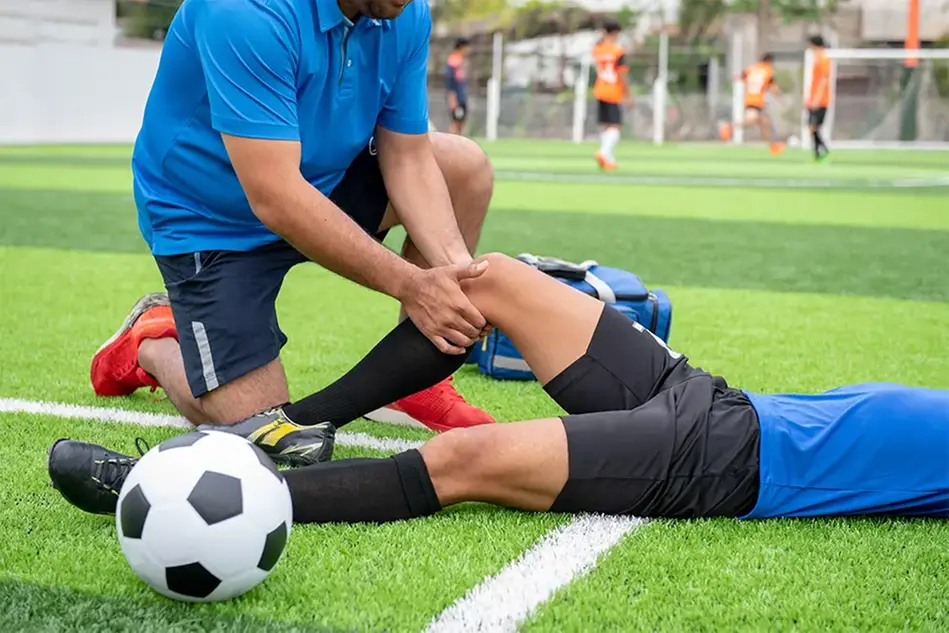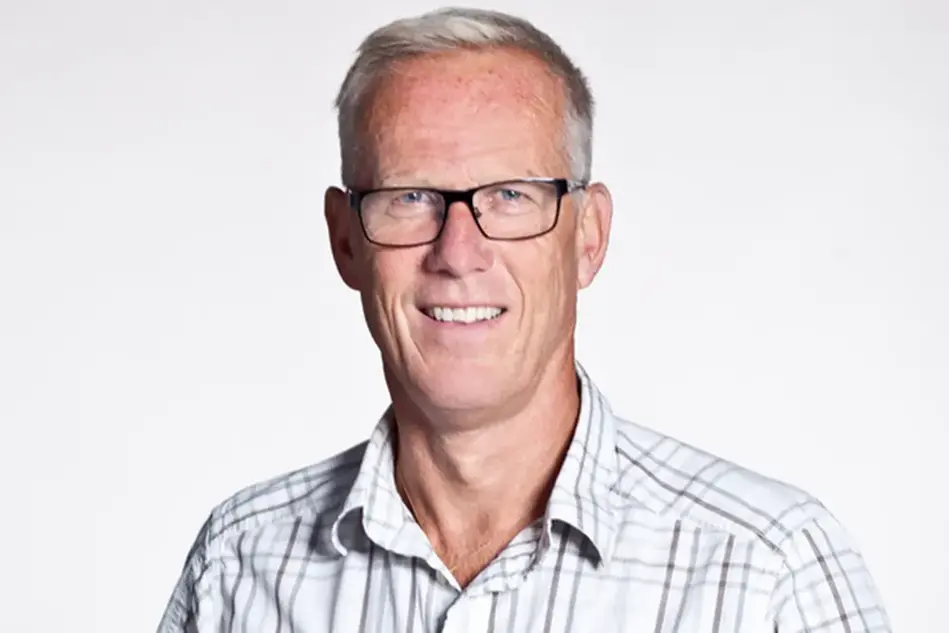Professor’s portrait: Urban Johnson and the story of the academic subject sports psychology
Why do some people manage to come back after a sports injury and others do not – even when the conditions are about the same? That question shaped the research career of Urban Johnson, Professor of Psychology.
“Many are very lonely during this period, they feel sorry for themselves and have difficulty formulating goals and motivation. Early on, I came to the conclusion that it is about seeing people in a biopsychosocial context.”
Urban Johnson
Urban Johnson, a handball coach in Halmstad in the 1980s, could never have imagined that he would be a professor a few decades later – let alone in a subject that barely existed at the time.
“As a coach, I used to wonder how there could be such a big difference in rehabilitation when two players injured themselves in a similar way and with the same conditions. Some came back quickly; others did not come back at all. That, in combination with a general interest in psychological aspects in sports, has probably taken me to where I am today,” says Urban Johnson.
In the 1980s, research on sports psychology and sports injuries was limited, almost non-existent. Urban Johnson searched for information but felt that he had discovered a relatively unexplored topic.
“When it came to rehabilitation of injured athletes, there was a lot of focus on the physiological, while the psychological aspects were basically ignored. It was considered complex and unclear – and the fact is that it is easier to measure how the ligaments inside the knee heal after a cruciate ligament injury than the person's well-being. I believe this makes you lose sight of the holistic perspective; there are multiple and important factors that interact in the rehabilitation process.”

Focus on rehabilitation and psychological factors
In his research studies, Urban Johnson began to study the psychological mechanisms behind sports injuries, especially with a focus on rehabilitation. He was also interested in research on psychological factors that precede a sports injury – what happens before an injury occurs and whether it is in any way possible to identify people who are at risk of suffering injuries and ill health. Among other things, he identified the importance of having qualitatively strong social networks and having a problem-oriented stress management strategy during rehabilitation, as well as the importance of structured goal-setting – all of which are related to how well one manages to get back into sports again.
“Many are very lonely during this period, they feel sorry for themselves and have difficulty formulating goals and motivation. Early on, I came to the conclusion that it is about seeing people in a biopsychosocial context,” says Urban Johnson.
When Urban Johnson had finished his post-graduate education, the concept of sports psychology was still in its infancy. He made it his mission to establish and develop the subject at Halmstad University. In the beginning, he was mostly alone in that work. Today, there is an entire study programme in the field – Professional Psychology of Sport and Exercise.
There is also the program Professional Career in Sport and Working Life. Both study programmes are unique in Sweden, they are only offered at Halmstad University.

Sports psychology put into practice during the World Cup
Today, sports psychology as a subject is not only an accepted area of research, but also something used in practice. The 2018 FIFA World Cup is one example.
“At that time, the Swedish national team had its own sports psychologist, incidentally a former student at Halmstad University. What I am seeing now is a greater understanding that an athlete is not just a physical person but a person in a context, and this context is being focused on now,” says Urban Johnson, and adds that he often visits associations and various sports science institutes to talk about the psychological aspects of sports and notes that interest is generally great in the world of sports:
“What you can see is that certain individual sports, where everything is determined on an individual basis, which makes it even clearer, have made more progress. Meanwhile, in team sports, you are dependent on others and the group dynamic processes are in greater focus. Nowadays, people within the Football Association talk about football psychology. It has become a natural part in several sports and in other contexts, for example in the military.”
Between 2007 and 2011, Urban Johnson was Secretary General of the European Federation of Sports Psychology (FEPSAC) and, between 2001 and 2019, he was a member of the Swedish Football Association’s medical committee. He has also been a board member of the Swedish Research Council for Sport Science as well as editorial member of numerous scientific journals and councils.
Book on psychological aspects of sports injuries
Urban Johnson and his colleague, Senior Lecturer Andreas Ivarsson, are the editors of the book Psychological Bases of Sport Injuries (2020). Co-authors are experts in sports psychology and sports injuries from North America, Europe, and Australia.
“The book is about psychosocial perspectives on sports injuries, for example injury prevention work based on psychological intervention and updated research on depression and ill health as a result of sports injuries.”
One research project within the same subject is about alternative interventions in connection with injury rehabilitation, where the effect of a mindfulness and acceptance-based intervention for long-term injured competitive athletes was investigated. Another example is a research project on smart outdoor gyms in collaboration with the companies Eleiko and Swedish Adrenaline as well as Halmstad Municipality.
Urban Johnson is the project manager for the Swedish National Sports University, a collaboration between Halmstad University and Malmö University. Being a national sports university means that Halmstad University supports competitive athletes who want to combine their sports career with higher education through flexible and adapted solutions for their studies.
In connection with this work, Urban Johnson, together with his colleagues, also conducts applied sports research.
“It is both an exciting and challenging mission to conduct research about both the top-tier in sports, such as competitive sports and dual careers, but also psychological issues related to adapted physical activity, inclusion in non-profit leadership issues, and sustainable sports.”
He is a dedicated runner and cyclist. His involvement in handball continues, as a match coach or sports psychology advisor to active children, youths, and seniors, as well as to coaches and leaders all over Sweden. Practical experiences and contact with society outside academia has always been the basis for the psychology professor's research.
“For me, the practical work has been key, not least to gain an understanding of the context I study.”
Text: Hanna Grosshög
Translation: Space 360
Pictures: Magnus Karlsson, iStock
About Urban Johnson
Urban Johnson was born in 1961 in Lund. He studied Psychology at Lund University in 1981–1982 and 1988. Between 1982 and 1985, he studied sport pedagogy at Halmstad University. After that, he worked full time as a qualified handball coach for the handball club HK Drott for a few years, especially with young people and juniors. In 1989, he began his doctoral studies in Psychology at Lund University, where he received his doctorate in 1997 with the dissertation ‘The long-term injured competitive athlete: A study of psychosocial risk factors’.
Urban Johnson became a Senior Lecturer in 2005 and a Professor in 2011. His research is primarily about psychological aspects of sports injuries and his research interest also includes other research areas, for example with a focus on physical activity, health, and well-being. In recent years, he has published the following:
- Martin, S., Johnson, U., McCall, A., & Ivarsson, A. (2021). Psychological risk profile for overuse injuries in sport: an exploratory stud. Journal of Sports Science. Manuscript accepted for publication.
- Piussi, R., Ferid Krupic, F., Senorski, C., Svantesson, E., Sundemo, D., Johnson, U., & Hamrin Senorski, E. (2021). Psychological impairments after ACL injury–do we know what we are addressing? Experiences from sports physical therapists". Scandinavian Journal of Medicine and Science in Sports. Manuscript accepted for publication.
- Parker, J., Johnson, U., Ivarsson, A. (2021). Is Perceived Autonomy Support Provided by a Coach Related to the Intention of Injury Preventative Behavior Among National and International Level Golfers? Frontiers in Sports and Active Living 3:569590. doi: 10.3389/fspor.2021.569590
- Ekengren, J., Stambulova, N., Johnson, U., Ivarsson, A., & Schinke, R. J. (2021). Career assistance to the team in crisis-transition: An intervention case study in Swedish elite handball. Case Studies in Sport and Exercise Psychology, 5, 10-19. doi: 10.1123/cssep.2020-0015

